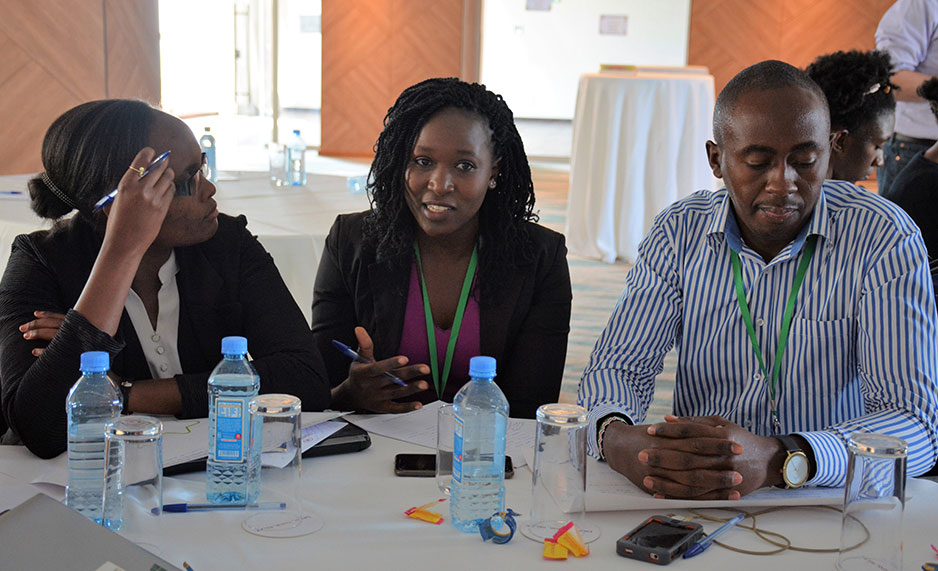Meet Elvine, an energy and climate change researcher at SEI Africa. She initially worked with rural communities on water and sanitation issues, and is now involved with climate change adaptation, household energy, agriculture, climate finance and more. Here she shares her research work; her interest in bringing research findings back to local communities; and her goal to be a voice for Africa in global climate policy.
Elvine Kwamboka at SEI Africa: Photo: Caroline Njoki / SEI.
What drew you to climate change and sustainability work?
I have a background in environmental science, and while I was awaiting graduation at school I did an internship with a local organization here in Nairobi. I worked with water and sanitation issues, created climate change awareness in the rural communities, and trained farmers on best agricultural practices.
I realized that many of the community members I was working with were not contributing much to greenhouse gas emissions, but were most at risk from the effects of climate change through crop failure, prolonged droughts, and flooding. It just seemed so unfair. After supporting that programme for six months I gained a deeper understanding of the dynamics of climate change, and knew I wanted to pursue that topic.
What do you do today at SEI?
Today I’m involved in several projects. The main one is Switch Africa Green on the dissemination of sustainable consumption and production (SCP) practices. My role is to document and promote SCP practices along the dairy, coffee and mango value chain in Kenya. We also conduct trainings for agri-entrepreneurs to enhance their business models through the adoption of these practices.
Switch Africa Green fieldwork in Machakos County, Kenya. Photo: Judith Mugambi / SEI.
The other project I’m working on focuses on the use and adoption of clean burning pellets in rural and peri-urban Kenya. This involves mapping pellet stove activities, utilizing service design techniques to better understand user experiences, and using stove use monitors to quantify how pellet stoves are incorporated into household cooking.
I’m also doing a systematic review for SEI’s synthesis on multidimensional poverty to map SEI’s current project portfolio into Sida’s multidimensional poverty framework.
Another project is Share or Spare, looking at the factors that shape the coordination of climate finance in low-income countries. The project is just starting now and looks really exciting. And there are other projects I am involved in, such as SENSES and the bioeconomy initiative.
Discussions with mango entrepreneurs in Mombasa (left) and Kitui County, Kenya (right). Photos: Judith Mugambi / SEI.
You’ve also been involved in communications work. What interests you about science communication?
In my view, science is like any other good or service – it must be strategically communicated to tell a more complete story that includes more voices and resonates with diverse audiences.
As researchers, we tend to have specialized knowledge and a rigorous focus on research details that our audience likely does not share. We should find ways to bridge the gap between the “science world” and the general, non-scientific public.
I want to communicate back to the people who provided information in local communities to help them understand their contributions and the research findings. This involves thinking about how to package information to the target audience by framing our work, localizing it, and making it resonate with people’s everyday lives. If people can see a personal benefit, they are more likely to be interested in our research and listen to the recommendations.
What would you like to achieve in your career?
I would like to be an accomplished researcher in climate change issues. Climate impacts have been evident not only in Kenya, where I’ve spent most of my time; but also in most developing countries with limited capacity to endure climate risks. I want to align myself to do more work around climate change policy. Coming from the policy direction, it will mean providing actionable recommendations on how decision-makers can address climate change-related challenges. Climate scientists have had a great impact on policy decisions, and without them climate change would not be where it is today – right at the top of the political agenda. So, I’m looking into growing more in that area.
Elvine (centre) providing comments at a clean cookstove workshop in Nairobi. Photo: Caroline Njoki / SEI.
Do you want to do that work in the context of Kenya, or Africa, or globally?
I wouldn’t want to limit myself into the national context, since climate change is a global challenge. I have started at the national level but look forward to representing and speaking out for Africa in global forums. There is an overwhelming sense of fear about the future of the planet and it’s hard not to feel that way when looking at the current climate projections.
What advice would you give someone who’s thinking of applying for a job at SEI?
SEI is an exciting organization, but you need to think about your career aspirations and the kind of work you want to do. A career in scientific research is highly demanding. However, for those who have been drawn into research, it offers a unique intellectual challenge. Each assignment is an opportunity to distinguish yourself and make a real difference.
Join us to shift global policy and practice towards sustainability. We recruit regularly for our centres in Europe, Asia, Africa and the Americas.
Design and development by Soapbox.




